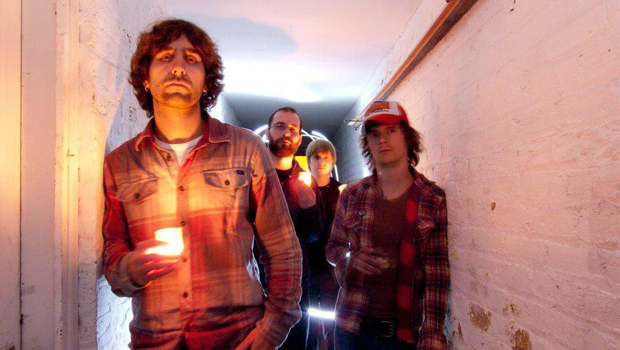All the latest guitar news, interviews, lessons, reviews, deals and more, direct to your inbox!
You are now subscribed
Your newsletter sign-up was successful

After the release of their last full-length album, What We All Come to Need, Chicago-based instrumental rock quartet Pelican drew some heat for imposing what critics called "conventional" song structures on their trademark sludgy, expansive sound.
While they were busy crying "foul" (slight avian pun intended) over Pelican's new brand of abbreviated songs — which in truth, is something they've with increasing regularity since 2007's City of Echoes — they either ignored or failed to recognize the larger narrative, perhaps the essential element of the band's overall effectiveness.
Speaking to a friend recently about this very issue, I likened Pelican's turn toward shorter songs to a writer choosing to chop up a novel into shorter chapters, opting to make the work more easily digestible without truly affecting the overall arc.
If What We All Come to Need is a novel, then the band's new EP, Ataraxia/Taraxis is a novella, and one that perfectly illustrates the above point. Listen to the opener, "Ataraxia," on its own and it could come across as a clipped interlude, when, in reality, it serves as a perfect introduction/companion to "Lathe Biosas."
Most audibly striking on Ataraxia/Taraxis is the stripped-back production style, something not entirely alien to Pelican but also not so readily apparent as it is here — part intent and part time constraints. The raw feel echoes the darker feel of the songs, as the band have seemingly abandoned the hopeful qualities that were so prevalent on What We All Come to Need. At least for now.
With the band entering a new stage in their career, I recently caught up with guitarist Trevor de Brauw to find out what's making Pelican tick these days.
GUITAR WORLD: There's only one track over five minutes — and barely over five minutes, at that — on the new EP, so it looks like the trend of shorter Pelican songs is continuing.
All the latest guitar news, interviews, lessons, reviews, deals and more, direct to your inbox!
Those are just the songs we wrote, and as always — really since City of Echoes — we've tried to write songs that are a little more to the point. We have our bouts up and down with trying to stay concise. Obviously, some of our songs benefit from longer arrangements and others don't. I think these songs are pretty much perfect at the length they are. They have specific ideas we're trying to get across, and we wanted to get them across in the most direct way possible.
When I first put the EP on, I could have sworn the first two tracks were actually one song, given how well "Ataraxia" flows into "Lathe Biosas." Did you write them as one song?
When we originally started working on this EP, the idea was that we were going to do a 7-inch of "Lathe Biosas" and "Parasite Colony." But it had been so long since we did a record — and we know it's going to a be a while writing our next album — that we wanted to make it into something that felt a little bit more complete and has more of an album feel to it.
So you're quite right that "Ataraxia" flows into "Lathe Biosas." "Ataraxia" was written to be an intro to the EP, and it uses the same chords at "Lathe Biosis." In fact, since "Lathe" was recorded with a click track, I actually matched the tempo for the intro piece as well. So the two are very much related.
What's your songwriting process like these days? Are you all still in the same city?
No. In 2006, Larry [Herweg, drums] and Bryan [Herweg, bass] moved to California, and since then there's been a lot of experimenting with different songwriting methods. Over the years, the people in their various cities have sort of met in teams and then brought ideas to the table. There's been a lot of file trading and sending song ideas back and forth. Then whenever we meet, we just work on whatever we had been tossing back and forth.
Bryan moved back to Chicago last January, so a lot of the writing lately has been coming from him and I getting together once a week and just jamming.
It's hard not to notice the raw production sound on the EP. Was that something you set out to do?
Yeah. The tone of these songs is a bit darker than, say, the last record, which was a record about maintaining hope in the face of darkness. This batch of songs is really meant to feel dark and aggressive. We definitely went into it looking to do something a little more raw. We also had less time to work with, which also influenced that a little bit.
The drums were recorded all over, but we decided to do the main tracking of the other instruments with Sanford Parker, who we worked with on our first album, our first EP. He's got quite a reputation for getting gnarly tones out of recordings.
Were these songs all written for the 7-inch (which became the EP), or were some the product of writing sessions for the new album?
Two of the songs had kind of started in seed form during the last album. We went from being a full-time band in 2009 to more of a part-time band in 2010 and 2011, because we weren't able to maintain the rigorous touring schedule that we were when we were younger. Some of us have families now, so we kind of scaled back.
Two of the songs were holdovers from What We All Come to Need, but they weren't finished, and they took a while to finish. When we realized that we were doing an EP, we went ahead and composed a couple more songs specifically for the EP in order to give it that full-album feel I was referencing earlier.
It took us a bit longer to get the gears turning. The EP was meant to light a fire under our ass and get the momentum going so we could finally start moving toward putting out another full-length. I think the gears are turning creatively for the LP, and we've already started writing a lot of stuff for the next record. It's another step in the process, I guess.
What were your main guitars on Ataraxia/Taraxis?
As usual, I played my '72 Gibson SG with Seymour Duncan pickups. I know Laurent [Schroeder-Lebec, Pelican's other guitarist] played his silverburst Les Paul. I think it's an '81, but I'm not positive.
And that's you playing the acoustic guitar on "Ataraxia"?
That's correct.
What kind of acoustic did you use?
It's an old Fender acoustic-electric I bought when I was a teenager. [laughs] I never invested in a very good acoustic guitar, but it gets the work done.
How about your pedalboard? Has it changed much through the years or does it remain pretty consistent?
I've been swapping a bunch of them in and out. At the core of it, I always have an Ernie Ball volume pedal so that I can maintain total control over my dynamics. Then I kind of have a shifting array of delay pedals. I almost always have a Line 6 DL4. I always have my Akai Head Rush, and lately I've been using a Deja Vu tap delay.
We have a Seymour Duncan endorsement, and sometimes they hook us up with stuff. They're not really known for their pedals, but I have one of their tremolos and one of their delays that are both pretty cool. I want to get into using more tremolo, but I haven't figured out how to integrate it too well with any of the Pelican songs. But I've always really liked the sound of that effect.
Delay has always been a cornerstone of your sound with Pelican. How has your approach to using it changed over the years?
In the early days of the band, I didn't give a rat's ass what tempo the delay was at. [laughs] Over the years, I've gotten a little more anal retentive about it. I really like that you can tap out the tempo before you turn the effect on. The thing with the Line 6 is that you have to turn it on and then tap out the tempo after it's already on, which can sound kind of awkward. With both the Head Rush and the Deja Vu, that's kind of taken care of. You can see the tempo of the delay before you switch it on.
What about your amps on Ataraxia/Taraxis?
Right now I'm using a Marshall JCM-800. It's from the brief period when Marshall was switching production from the JCM-800 to the JCM-900, so although it's basically an 800, it's a two-channel amp, which they only made for a little while. I think the gain is a little bit darker sounding, a bit moodier than either the 900 or the 800.
Looking at your tour itinerary, I see you guys have a couple of weeks of European shows in support of the EP, but no U.S. dates.
[Laughs] Yeah, as I was talking about earlier. We're just not able to tour full time anymore, so we kind of have to pick and choose where we go and when we do it. 2009 was our last album and we toured the U.S., and we kind of closed the book on touring for a while after that. We haven't been over to Europe since, I think, late 2008, when we were still touring City of Echoes.
So when we were planning this record and planning the touring around it, we decided a trip to Europe was overdue. They've been waiting too long. We'll have time for a couple of weekend things [in the U.S.] here and there, but we're probably not going to do much more in the U.S. until we have a new record.
Is there a time frame set for the new record?
Not specifically, but hopefully it'll be done by the end of the year and out in 2013.
On your last record, the last track, "Final Breath," features the first appearance of vocals on a Pelican album. Now that you've had time to get some reactions from the fans and reflect on it yourself, how do you feel about that decision?
We had been saying for quite a long time, both internally and in interviews, that we're not instrumental by design, we're instrumental because we were too lazy to find a singer. We always said that if we ever wrote a song that needed — not even needed, but would benefit from — vocals, we would do what we could to make it work.
The instant Bryan wrote that song, we all heard Alan [Epley, The Life and Times] singing. Luckily, he was open to the idea. We didn't know how people were going to react, because it did seem like a lot of our fans are into us as an instrumental band, but nobody was turned off by the vocals. Alan really respected the song. The contribution felt very musical and perfect, and I think the fans heard it that way as well.
So you would consider doing it again if the song called for it?
Oh yeah, definitely. We would definitely do it again. It was a great experience.
Pelican's new EP, Ataraxia/Taraxis is out now on Southern Lord Records. Pick it up via iTunes here.
Josh Hart is a former web producer and staff writer for Guitar World and Guitar Aficionado magazines (2010–2012). He has since pursued writing fiction under various pseudonyms while exploring the technical underpinnings of journalism, now serving as a senior software engineer for The Seattle Times.

